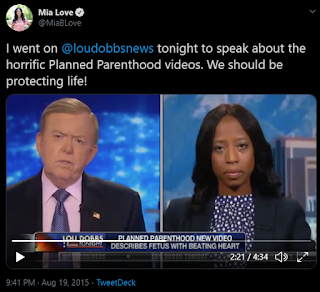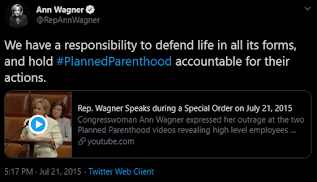Female Republican politicians were the most vocal about defunding Planned Parenthood
On May 18 the Journal of Women, Politics, & Policy published “Standing Up For Women? How Party and Gender Influence Politicians’ Online Discussion of Planned Parenthood.” In this study, researcher Morgan Johnstonbaugh analyzed tweets by members of the 114th House of Representatives regarding Planned Parenthood. She narrowed the focus to tweets made between July 1 and Novemeber 1, 2015, during a heated debate on whether to defund PP in response to the CMP videos suggesting PP sells fetal organs.
Johnstonbaugh hypothesized that women would write more tweets about Planned Parenthood than men, and Democrats would write more than Republicans.
For her hypothesis about gender, Johnstonbaugh theorized that “men may be disinclined from dicussing and addressing women’s issues because feminine issues are perceived as having lower status.” (If she is aware of the “no uterus, no opinion” factor — the vocal and persistent insistence that men have no right to speak about abortion — she doesn’t mention it.) Johnstonbaugh’s analysis did find that female Democrats are more vocal about this issue than male Democrats, and female Republicans are more vocal about the issue than male Republicans.
For her hypothesis about political party, Johnstonbaugh theorized that there would be more PP-related tweets from Democrats than Republicans because Democrats focus more than Republican’s on women’s issues. To her surprise, though, her analysis found the opposite to the be the case.
Female Republicans constituted 5% of the House and wrote 12.6% of the tweets about Planned Parenthood while male Republicans made up 51.7% of the House and wrote 68.6% of the tweets about Planned Parenthood.
and
While it is clear that women write more tweets about Planned Parenthood than men within their political party, female Republicans are the most active members in the online discussion.
Female Republicans were the most vocal group, followed by male Republicans, female Democrats, and lastly male Democrats.
 |
| Rep. Mia Love, R-Utah |
As I read these results I wondered if they reflect the “intensity gap” between pro-choice and pro-life people: the idea that those of us against abortion are more likely to feel passionately about the issue than those who support the status quo. For example, according to PRRI, “Americans who oppose the legality of abortion (27%) are significantly more likely than those who support the legality of abortion (18%) to say they will only vote for a candidate who shares their views on the issue.”
Apparently Johnstonbaugh didn’t enterain the intensity gap theory, though. Instead she speculated that Republicans wrote more PP-related tweets because pro-life ideas are simplistic, whereas the pro-choice perspective is too nuanced to convey over Twitter:
This unexpected finding may be related to the ease with which provocative pro-life propaganda can be spread on Twitter by incorporating videos, images, and only 140 characters for each message, compared to regulations or statistics meant to support Planned Parenthood, which may require a greater amount of text or explanation.
This theory is so transparently biased I actually laughed a little when I read it. I expect pro-lifers will continue to mystify researchers who can’t see past their own worldviews.
 |
| Not all pro-choice tweets require a lot of nuance. |
Johnstonbaugh points out that previous research found female Democrats are traditionally the most vocal about women’s issues, suggesting an apparent contradiction with this study’s finding. However the contradiction exists only if we view Planned Parenthood solely through a “women’s issue” lens. Johnstonbaugh’s additional analysis confirms that many people see more factors in the PP controversy.
She examines how often House members framed the Planned Parenthood discussion in the following ways:
- Women’s Issue: defunding PP is important particularly to women
- Planned Parenthood Healthcare: defunding PP will harm people who rely on the org for healthcare
- Alternative Healthcare: there are better healthcare options than PP
- Fetal Rights Issue: defunding PP will help protect unborn children
- Condemn Planned Parenthood: defunding PP is a way to condemn PP for immoral treatment of fetal tissue
While both female Republicans and Democrats discussed Planned Parenthood as a women’s issue and healthcare issue, Republican women also discussed it as a fetal rights issue.
If you have any understanding of the pro-life perspective, this finding should be predictable. Pro-life people recognize the fact that abortion kills humans. We view those humans as children (morally relevant young humans deserving protection). So we view abortion first and foremost as a human rights violation. Of course pro-life politicians are going to discuss Planned Parenthood in the context of fetal rights. That’s basically another way of saying pro-life people will discuss abortion from a pro-life perspective.
 |
| Rep. Ann Wagner, R-Missouri |
Johnstonbaugh’s finding about Republicans vs Democrats is mystifying only if you view PP solely through the “women’s issue” framing, but I don’t know why anyone would do that. You don’t have to be that involved in the abortion debate to know that many people view PP as a more complicated and controversial organization. Huge swaths of the country — including countless women, btw — see abortion as an issue that affects not only women but also preborn children. Pro-life Republican women might be less vocal about women’s issues generally, but Planned Parenthood is not simply a “women’s issue” topic. It goes well beyond that.
 |
| Rep. Jackie Walorski, R-Indiana |
Johnstonbaugh called her findings about Republicans vs Democrats “unexpected,” “counterintuitive,” and “surprising,” but they shouldn’t be. Pro-lifers have been quite vocal, for decades, about the facts that we view abortion as a human rights issue and we care deeply about the problem. If pro-choice people could internalize our most basic premise — not agree with it necessarily, just recognize it’s what we think — they would be caught off guard less often.


Leave a Reply
Want to join the discussion?Feel free to contribute!